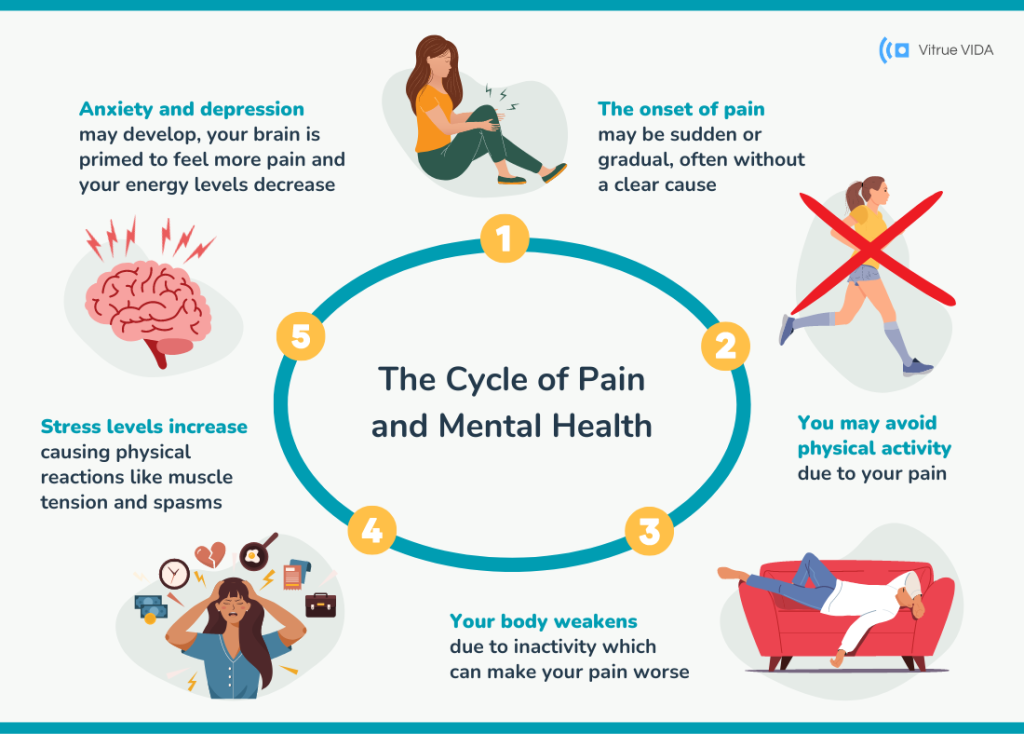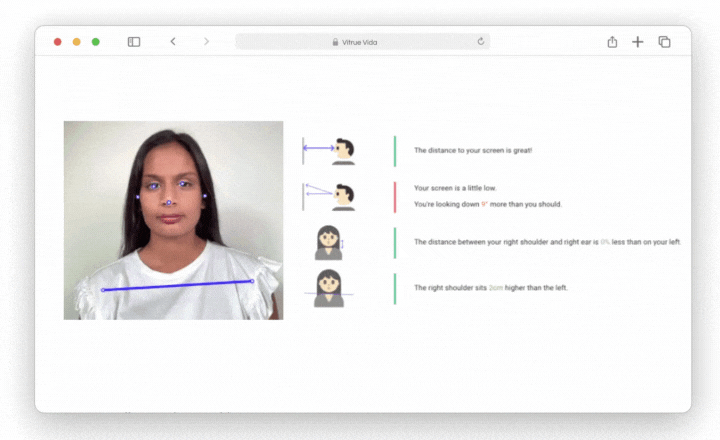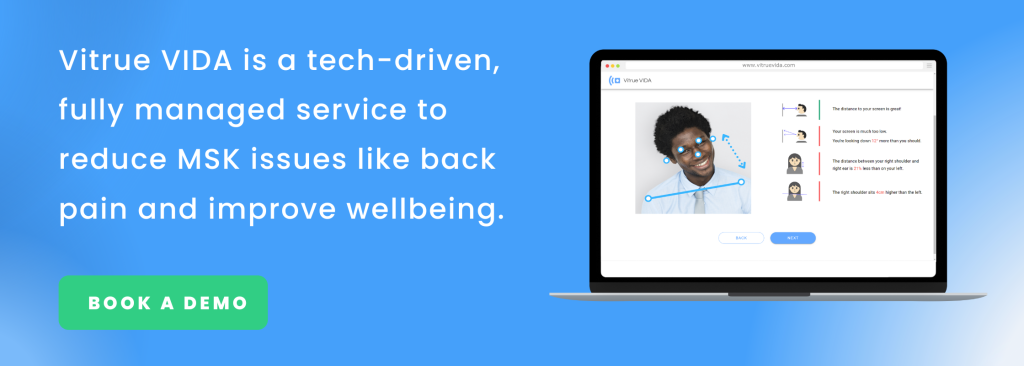65% of desk workers are suffering with musculoskeletal (MSK) issues like back pain. 1 in 6 people experience mental health problems in the workplace.
Pain and mental health are two of the biggest occupational health costs for employers worldwide. They are often treated as separate wellbeing issues, but in reality they are intrinsically linked. Your mental health can strongly affect your pain, and vice versa.
How are pain and mental health intertwined?
615 million people suffer from depression and anxiety worldwide and mental health-related absences are at an all-time high. There are many reasons why a person may develop mental health problems, but they are especially common amongst people with chronic MSK pain, with 54% of these people also experiencing severe anxiety. People with chronic pain are four times more likely to develop depression compared to those without pain.
Did you know? Any pain that lasts for more than three months is considered chronic. The majority of chronic pain cases are ‘non-specific’, as it’s not possible to pinpoint the exact cause of the pain.
It’s not just chronic pain that can weigh down your mental health. Even short term pain as a result of injury can have a big impact, as you may unnecessarily avoid activity in an attempt to keep the pain away. This can actually make matters worse, as your body may weaken and decondition causing even more pain. A cycle of activity avoidance begins, which is harmful to your physical and mental health.
On the other hand, your mental health has a big impact on your habits and motivation levels. It affects your ability to adopt healthy behaviours, such as a good diet and exercise. Engaging in regular exercise for as little as 20 minutes each week can improve your mood and physical wellbeing, but poor mental health is often a significant blocker.

Here are some common mental health and psychological conditions that affect pain:
- Anxiety – You’re more likely to perceive your pain as intense and the condition often primes your brain to feel more pain.
- Depression – Low energy, fatigue and low motivation in a depressive state can stop you from engaging in physical activity. In most cases, lack of physical activity makes your pain worse over time.
- Emotional reactivity – The continuous stress of chronic pain can predispose you to negative emotions such as anger, fear and guilt.
- Chronic stress and low resilience – The tensing of your body in response to stress may cause muscle tension and spasms. These physical reactions have a direct impact on the amount of pain you feel.
Pain and poor mental health are often influenced by workplace factors such as your workload, desk setup and working habits. The good news is that employers have the power to break the vicious cycle with a wellbeing strategy that addresses both pain and mental health.
How to break the vicious cycle and improve your pain and mental health
There are simple ways you can tackle work-related pain, boost mental health and keep both factors in a happy equilibrium. Vitrue VIDA has many features to help you along the way:
1. Understand your pain
Did you know that educating yourself on the science behind pain can reduce your pain by up to 50%? Understanding the healing process can also have a huge impact.
VIDA Pain Coach contains a library of educational articles to help you learn more about your specific pain area and understand your path to recovery.
2. Improve your workplace ergonomic setup
28% of employees are working at a workspace with substantially increased MSK health risks, making them more susceptible to issues like back pain. In most cases, these issues can be prevented with small adjustments to a workplace, such as repositioning a screen or raising a laptop.
With VIDA’s AI webcam assessment and interactive desk planner, you can assess your workspace in minutes and receive instant, personalised recommendations to improve your posture and workplace ergonomics. Employees with good posture and a comfortable workspace emit a higher level of confidence and feel happier, all while reducing work-related pain!

3. Adopt healthier working habits
Your general working routine and habits can have a big impact on your mental and physical wellbeing. Things like the frequency and duration of your breaks, how often you exercise, whether you have lunch away from your desk and even the clutter in your workspace can make a huge difference!
VIDA provides personalised recommendations focused on improving your general wellbeing. It offers simple and effective things you can do to adopt healthier habits at work.
Did you know? Adding plants to your workspace can help you feel less stressed and improve productivity and wellbeing by up to 47%.
4. Take steps to build work resilience
As discussed above, chronic stress can wreak havoc on your mental health and make you more susceptible to developing MSK pain. Only a third of UK employees feel they are resilient and able to cope with stress at work. These employees are four times more likely to develop burnout.
Vitrue Health’s scientifically-backed work resilience assessment offers completely confidential, personalised guidance to build work resilience and handle stressful situations at work.

5. Introduce physical activity
Exercise is one of the most beneficial things you can do to keep your mind and body healthy. The health benefits increase with the amount of time you spend active. However, even a few short bursts of light physical activity can transform your mood and ease your pain.
If you’re struggling to motivate yourself to exercise, VIDA Pain Coach is here to help. Pain Coach is a personalised pain management programme with tailored exercises to help you gradually incorporate physical activity into your routine, helping you and your team stay healthy and pain-free.
For more information on how VIDA can help you break the vicious pain-mental health cycle and boost wellbeing in your team, get in touch with us at sales@vitruehealth.com.





